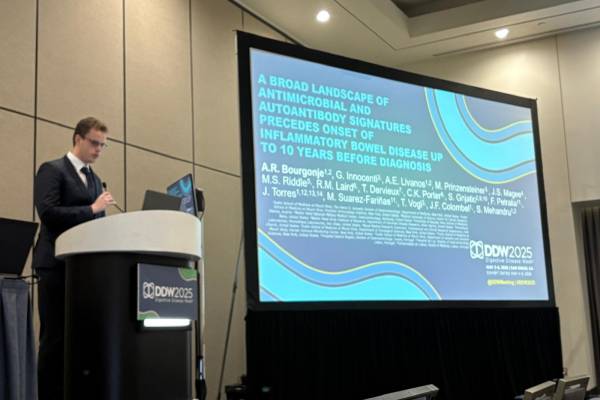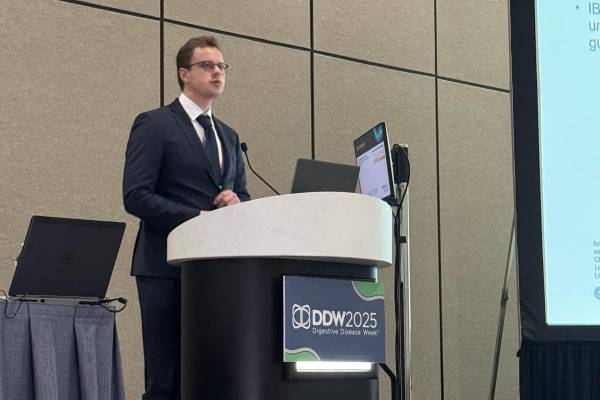INTERCEPT at Digestive Disease Week 2025: A Step Closer to Intercepting Crohn’s Before It Strikes
From 3-6 May 2025, leading minds in digestive disease research gathered in San Diego, CA, in the United States for Digestive Disease Week (DDW) under the motto “Be Gutsy”. DDW is a significant global meeting for digestive health clinicians, researchers and industry professionals from around the world. Among the many thought-provoking presentations, the INTERCEPT project was well represented, with several of our partners sharing pioneering work on the early detection of Crohn’s disease (CD).
For INTERCEPT, the timing of this scientific exchange could not have been more relevant. As a consortium dedicated to identifying predictive biomarkers and developing a blood risk score for Crohn’s disease in the pre-clinical stage before symptoms manifest, DDW provided the perfect stage to align with global research efforts and raise visibility for our mission: pioneering a future without Crohn’s disease.
Dr Arno Bourgonje, a postdoctoral fellow from INTERCEPT partners Icahn School of Medicine at Mount Sinai and University Medical Center Groningen, gave a presentation in the AGA Basic Science Plenary Session focused on pre-clinical antibody repertoires detectable up to 10 years before a Crohn’s diagnosis making it possible to predict an IBD diagnosis with high accuracy. His presentation entitled Broad landscape of antimicrobial and autoantibody signatures reveals selective reactivity in the pre-clinical phase of Inflammatory Bowel Disease adds compelling evidence to the idea that preclinical immune system perturbations occur long before patients report their first symptoms – a foundational insight for INTERCEPT’s approach. For his research, Bourgonje collaborated with other researchers from Icahn School of Medicine at Mount Sinai, Hospital da Luz and Prometheus Laboratories Inc, all partners of the INTERCEPT project.
In discussing his participation at DDW and the significance of INTERCEPT, Bourgonje explained: “Showcasing our study at DDW was a fantastic opportunity to share our data with the international digestive health community and to connect with leading experts who are working towards the same goal.”
He continued, “The INTERCEPT consortium reflects the power of collaboration, combining academic, clinical and industry expertise to tackle one of the most pressing challenges in IBD research nowadays. What makes INTERCEPT truly unique is its focus on the preclinical phase of Crohn’s disease. Through identifying early biomarkers and building a predictive serological test, we are taking concrete steps towards a future where we can intervene before symptoms arise.”
Other INTERCEPT partners from GETECCU, Örebro University and industry lead TAKEDA also shared data and insights across a range of presentations and panel discussions. Their presence at DDW not only emphasized the urgency of early detection in Crohn’s disease, but also underscored the importance of large-scale, collaborative projects like INTERCEPT. In discussing the strong collaborative nature of the project, Bourgonje emphasised “While our vision may sound bold, we believe that it is within reach given the strength of our collaborative network, the depth of available longitudinal cohorts and the growing momentum in prediction and prevention research worldwide.”
As we move forward, the conversations at DDW serve as a reminder: the future of Crohn’s care lies not only in managing the disease, but in catching it before it begins. The INTERCEPT project is proud to be part of this next chapter.

